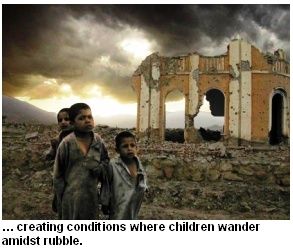| « What's Thanksgiving really all about? | As the Light onto the Nations » |
Has "nation building" ever succeeded?
November 21, 2009 was a bad day for Afghanistan if you look at the news reports. That's nothing new. Afghanistan has had decades of bad days since the Soviet invasion and the civil war sustained by U.S. financial and intelligence efforts in partnership with the Pakistani intelligence community.
There are two assumptions that justify the essential role of the question in any further effort by the United States in Afghanistan. 100,000 of the finest troops in the world can't subjugate a nation of 31 million people indefinitely. In order to achieve the "mission," there must be a viable government with the motivation and ability to keep in check those forces dangerous to the U.S. These two assumptions form the criteria for"nation building" (or "state building").
If there are some examples of nation building as referents, then there might a justification for further military and political presence. If there are no real examples of nation building, then the current administration's decision making process is based on an empty concept, one that merely justifies occupation and ongoing warfare based on deliberately unstated reasons.
Nation building defined
The Overseas Development Institute, a British think tank, defines nation building as follows:
In its simplest formulation, state-building, especially as understood by the international community since the 1990s, refers to the set of actions undertaken by national and/or international actors to establish, reform and strengthen state institutions where these have seriously been eroded or are missing (Caplan 2005). Key goals of state-building include provision of security, establishment of the rule of law, effective delivery of basic goods and services through functional formal state institutions, and generation of political legitimacy for the (new) set of state institutions being built (Brinkerhoff 2007). Understanding State-Building from a Political Economy Perspective Overseas Development Institute (ODI), Sep 2007 (p. 13)

ODI provides three transition points at which nation building begins:
Type I nation building occurs when an empire collapses and the remaining states need to rapidly develop their own systems of governance (e.g., the end of the Hapsburg Empire, British rule in India, and the Soviet Union's demise). Type II nation building occurred as colonies cut their formal ties with the English, French, etc. Modern African states are the most recent examples. Type III nation building is defined as states collapsing due to some crisis point or civil war (e.g., Afghanistan and Iraq).
ODI forgot to mention one critical trigger for Type III nation building: the bereft condition of nations that are invaded, crushed, and driven into chaos after an invasion by a larger power. Iraq is a good example of this, as is Afghanistan.
So, has "nation building" ever succeeded or is this just another example of the term simply a diversion from the real motivations behind any continued occupation of Afghanistan?

Marina Ottaway Council on Foreign Relations, 2002
Nation Building Is a Quagmire
"Not necessarily. Nation building is difficult, but it need not become a quagmire as long as the effort has clear goals and sufficient resources. Compare Somalia and East Timor: The United States and the United Nations stumbled into Somalia without a plan. As a result, what began as a humanitarian mission to feed people starved by rival warlords became a misguided attempt at ad hoc nation building as U.S. troops sought to capture Somali warlord Mohammed Farah Aidid. ...
"In East Timor, by contrast, the international community followed a plan and was not dragged into a situation it could not control. Right from the start, the United Nations sought consensus for nation building by organizing an unprecedented plebiscite on independence from Indonesia."
Of course, the author left out this important fact, which she may not have known at the time:
UNITED NATIONS, Jan. 24, 2006 -- U.S. political and military support for Indonesia was vital to its ability to invade East Timor in December 1975 and to sustain a brutal 24-year occupation that cost the lives of at least 100,000 people, parts of a Timorese inquiry made public Tuesday show. Washington Post, Jan. 25, 2006
Nation building in East Timor was required by the now well documented U.S. assistance to the invaders of East Timor in the form of weapons, money, and political efforts.
In my opinion, nation building is just a euphemism for the mess created when great powers invade smaller nations. It's not a viable concept or even a term with any meaning.
END
This material may be used in part or in whole with attribution of authorship and a link to this article.
Photographs: Girls studying,CC Bombed children


